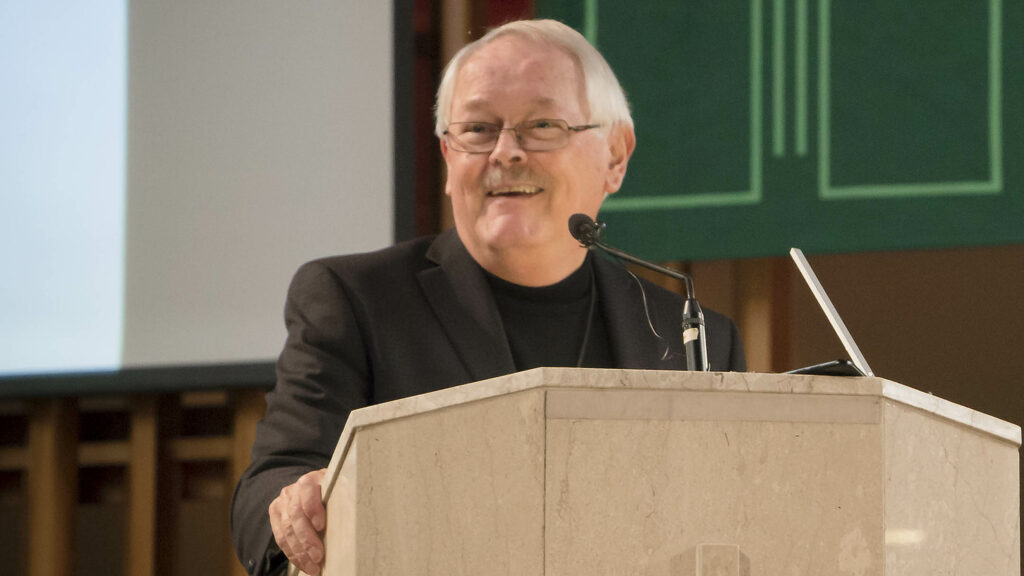A number of years ago at a symposium on faith and evangelization, one of the speakers made a rather startling statement. She, a Christian activist, ended her presentation with words to this effect:
I work for the poor and I do it out of my Christian faith. I’m committed to this because of Jesus, but I can go for three years on the streets without ever mentioning his name because I believe that God is mature enough that he doesn’t demand to be the center of our conscious attention all the time.
Like many others in the audience, I’d never heard a spiritual writer or preacher ever say this so bluntly. I’d heard biblical scholars speak of God’s self-emptying in the incarnation, of Christ’s burying himself into anonymity, and of God’s patience in being ignored, but I’d never heard anyone say so plainly that God doesn’t mind that we don’t give him explicit attention for long periods of time.
But is this true? Is God okay with this kind of neglect?
There’s an important truth here, though only if it’s sufficiently qualified. Taken as it stands this can be used to justify too many things (spiritual laziness, selfishness, excessive self-preoccupation, culpable resistance to deeper thought, excessive procrastination with what’s important, and countless other things) that are not good.
But here’s its truth: God understands! God is a loving parent who understands the inattentiveness and self-preoccupation of his children.
God has not put us into this life primarily to see if we can keep our attention focused on him all the time. God intended for us to immerse ourselves in the things of this world without, of course, forgetting that these things are, at the end of the day, passing and that we’re destined for a life beyond this world.
We’re not on this earth to be always thinking of the eternal, though we’re not on earth either to forget about the eternal.
However, because the unexamined life is less than human, we also need to have moments where we try to make God the center of our conscious awareness. We need regular moments of explicit prayer, of meditation, of contemplation, of worship, of Sabbath, of explicit acknowledgement of God and of explicit gratitude to God. We do need moments when we make ourselves consciously aware that there is a next life, an eternal one, beyond this present one.
But, in the end, that’s not in competition with or in contradiction to our natural focus on the things of this life, namely, our day-to-day relationships, our families, our work, our concerns for health, and our natural focus on news, sports, entertainment, and enjoyment. These are what naturally draw our attention and, done in good will and honesty, will in the end help push our attention towards the deeper things and eventually towards God.
The great mystic, John of the Cross, tells us that if we’re sincere and honest as we focus on the mundane things in our lives, deeper things will happen, unconsciously, under the surface and we will grow closer to God.
For example, the famed monk, Carlo Carretto, shares this story: After living many years alone as a hermit in the Sahara desert and spending countless hours in prayer and meditation, he went back to Italy to visit his mother. She was a woman who had raised a large family and who had gone through years of her life when she was too burdened with responsibility and duty to spend much time in explicit prayer. What Carretto discovered to his surprise was that she was more contemplative than he was, not because all those hours of explicit prayer as a monk weren’t good, but because all those selfless tasks his mother did in raising her family and caring for others were very good.
And God understands this. God understands that we’re human, spiritually frail, busy, and instinctively geared towards the things of this world so that we don’t naturally move towards prayer and church, and that even when we are at prayer or in church, we’re generally still distracted, tired, bored, impatient, thinking of other things, and longing for prayer and church to be over with.
It’s not easy to keep God as the center of our conscious attention; but God both knows this and is not unsympathetic.
Kate Bowler, coming at this from the Mennonite tradition, comments on what the Church calls “Ordinary time”, that is, those times during the year when, unlike the Advent, Lenten, Christmas, or Easter seasons, there is nothing special to celebrate.
What happens then? Well, what happens then is that things get “ordinary”:
There is no birth at the manger or death on the cross, just the ponderous pace of people singing, praying, and keeping their kids quiet during the sermon. The magic fades and reveals the church for what it is: a plain people in a boring building who meet until kickoff.
Yes, most of the time that’s us, plain people in boring buildings waiting for the kickoff. And God understands perfectly.

